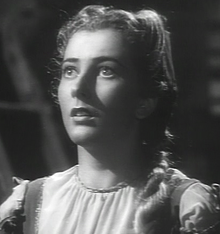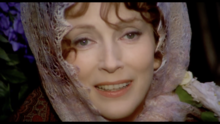Valentina Cortese
Valentina Cortese | |
|---|---|
 Cortese in The Jester's Supper (1942) | |
| Born | Valentina Elena Cortese Rossi di Coenzo 1 January 1923 Milan, Kingdom of Italy |
| Died | 10 July 2019 (aged 96) Milan, Italy |
| Other names | Valentina Cortesa |
| Occupation | Actress |
| Years active | 1941–1993 |
| Spouses |
|
| Children | Jackie Basehart |
Valentina Elena Cortese Rossi di Coenzo (1 January 1923 – 10 July 2019), sometimes credited as Valentina Cortesa,[1][2] was an Italian film and theatre actress.[3][4][5] Her screen career spanned over 100 productions across over five decades, from 1941 until 1993. Cortese won the BAFTA Award for Best Actress in a Supporting Role, and was nominated for both an Academy Award and a Golden Globe, for her performance in the film Day for Night (1973). In 2013, she received the French Order of Arts and Letters.
Over the course of her career, Cortese worked with many important Italian and international directors, including Michelangelo Antonioni, Federico Fellini, Franco Zeffirelli, François Truffaut, Joseph L. Mankiewicz and Terry Gilliam.[3] She was also active on stage, particularly in the company of Giorgio Strehler. Critic Morando Morandini described her as "one of the last divas of Italian theatre.... a mix of floral liberty, subdued decadence, belated D'Annunzio-ism and neurotic modern sensibility."[6]
Early years
[edit]
Cortese was born on New Year's Day in Milan. Her parents were Olga Cortese and Napoleone Rossi di Coenzo, of noble origins.[7][8] Cortese's father abandoned her mother shortly before her birth, and she was raised by her mother in the countryside, before being sent to Turin to live with her maternal grandparents in 1930.[3][4][5]
After meeting conductor Victor de Sabata, then married with children and 31 years her senior, she quit high school and followed him to Rome, where she enrolled at (and later graduated from) the National Academy of Dramatic Arts (Accademia d'arte drammatica).[4]
Career
[edit]She first appeared on stage before receiving a contract at Scalera Film in 1941[4] and giving her film debut with a small role in L'orizzonte dipinto.[5]
Cortese's first important film roles were in Roma Città Libera (1946), Les Misérables and The Wandering Jew (both 1948).[3] 1948 also saw the end of her relationship with de Sabata.[4] Her appearance in the British production The Glass Mountain (1949) led to numerous roles in international productions, including Jules Dassin's Thieves' Highway (1949), opted by her then-partner Dassin over the originally cast Shelley Winters,[9] and Robert Wise's The House on Telegraph Hill (1951).[3] In 1951, she married her The House on Telegraph Hill co-star Richard Basehart, with whom she returned to Italy.[3] Cortese continued to appear in national and international productions; the most notable of this era include Joseph Mankiewicz's The Barefoot Contessa (1954) and Michelangelo Antonioni's Le Amiche (1955).[3] For the latter, she received the Nastro d'Argento for Best Supporting Actress.[10]
In 1960, Cortese and Basehart divorced, and Basehart returned to the US, leaving in her custody their only child, Jackie.[3] In the following years, she worked for directors as diverse as Mario Bava (The Girl Who Knew Too Much, 1963), Bernhard Wicki (The Visit, 1964), Federico Fellini (Juliet of the Spirits, 1965), Robert Aldrich (The Legend of Lylah Clare, 1968) and Joseph Losey (The Assassination of Trotsky, 1972).[3] For her performance in François Truffaut's Day for Night (1973) she received the BAFTA Award,[11] the National Society of Film Critics Award[12] and the New York Film Critics Circle Award,[13] and was nominated for the Academy Award which ultimately went to Ingrid Bergman.[3][4][14] In her acceptance speech, Bergman remarked that she felt Cortese should have won the award.[15]
While her later films were mostly of lesser artistic interest, Cortese was continuously successful on stage,[3] working with Giorgio Strehler, with whom she had a long-lasting relationship,[3][4] Franco Zeffirelli,[3][4] Luchino Visconti[3] and Patrice Chéreau.[5] In 1980, she married industrialist Carlo De Angeli.[4] Her last film was Zeffirelli's 1993 Sparrow.[3]
In 2017, Francesco Patierno documented her life in the film Diva!, based on her 2012 autobiography Quanti sono i domani passati ("How many tomorrows have gone by").[3]
Death
[edit]Cortese died on 10 July 2019, aged 96.[3][16]
Selected filmography
[edit]- L'orizzonte dipinto (1941)
- The Actor Who Disappeared (1941)
- The Hero of Venice (1941) – Alina
- First Love (1941) – Nerina Redi
- Girl of the Golden West (1942) – Madge / Juanita
- The Jester's Supper (1942) – Lisabetta
- The Queen of Navarre (1942) – Eleonora d'Austria
- Soltanto un bacio (1942) – Maria Renda / Luisa Renda
- Orizzonte di sangue (1942) – Lidia
- Fourth Page (1942) – Valentina, la sua segretaria
- Happy Days (1942) – Marianna
- 4 ragazze sognano (1943) – Enrichetta Dorlence
- La carica degli eroi (1943)
- No Turning Back (1945) – Valentina
- The Ten Commandments (1945) – (segment "Non nominare il nome di Dio invano")
- Chi l'ha visto? (1945) – Luisella
- Rome, Free City (1946) – La ragazza
- A Yank in Rome (1946) – Maria, La maestrina
- Bullet for Stefano (1947) – Barbara
- The Courier of the King (1947) – Louise de Renal
- Les Misérables (1948) – Fantine and Cosette
- The Wandering Jew (1948) – Esther
- Crossroads of Passion (1948) – Maria Pilar
- The Glass Mountain (1949) – Alida
- Black Magic (1949) – Zoraida
- Thieves' Highway (1949) – Rica
- Malaya (1949) – Luana
- Women Without Names (1950) – Anna Petrovic the Jugoslav
- Shadow of the Eagle (1950) – Elizabeth, Princess Tarakanova
- The Rival of the Empress (1951) – Principessa Tarakanova
- The House on Telegraph Hill (1951) – Victoria Kowelska
- Secret People (1952) – Maria
- Lulu (1953) – Lulù
- Jealousy (1953) – Agrippina (voice, uncredited)
- The Walk (1953) – Lisa
- Angels of Darkness (1954) – Vally
- Marriage (1954) – Natalia Stefanovna Chubukova
- Avanzi di galera (1954) – Moglie di Luprandi
- The Barefoot Contessa (1954) – Eleanora Torlato-Favrini
- Adriana Lecouvreur (1955) – Adriana Lecouvreur
- Le Amiche (1955) – Nene
- Il conte Aquila (1955) – Teresa Casati
- Faccia da mascalzone (1956)
- Magic Fire (1956) – Mathilde Wesendonk
- The Rocket from Calabuch (1956) – Eloisa, the Schoolmistress
- Dimentica il mio passato (1957)
- Kean – Genio e sregolatezza (1957) – Fanny (uncredited)
- Amore a prima vista (1958)
- Love and Troubles (1958) – Marisa
- Square of Violence (1961) – Erica Bernardi
- Barabbas (1961) – Julia
- Axel Munthe, The Doctor of San Michele (1962) – Eleonora Duse
- The Girl Who Knew Too Much (1963) – Laura Craven-Torrani
- The Visit (1964) – Mathilda Miller
- The Possessed (1965) – Irma
- Juliet of the Spirits (1965) – Valentina
- Black Sun (1966) – Maria
- The Legend of Lylah Clare (1968) – Countess Bozo Bedoni
- Listen, Let's Make Love (1968) – Lallo's Mother
- Oh, Grandmother's Dead (1968) – Ornella
- The Secret of Santa Vittoria (1969) – Gabriella (uncredited)
- Give Her the Moon (1970) – Madeleine de Lépine
- First Love (1970) – Mother
- The Love Mates (1970) – Eva
- The Boat on the Grass (1971) – Christine
- The Iguana with the Tongue of Fire (1971) – Mrs. Sobiesky
- Chronicle of a Homicide (1972) – Luisa Sola
- Brother Sun, Sister Moon (1972) – Pica Di Bernardone
- The Assassination of Trotsky (1972) – Natalia Sedowa Trotsky
- Day for Night (1973) – Séverine
- Appassionata (1974) – Elisa Rutelli
- Tendre Dracula (1974) – (uncredited)
- The Kiss of Death (1974) – Elizabeth Blixen
- Amore mio non farmi male (1974) – Sabina Foschini
- Dracula in the Provinces (1975) – Olghina Franchetti
- Kidnap Syndicate (1975) – Grazia Filippini
- Son tornate a fiorire le rose (1975) – Sabina Foschini
- Nick the Sting (1976) – Regina – Nick's Mother
- The Big Operator (1976) – The Widow
- Jesus of Nazareth (1977, TV Mini-Series) – Herodias
- Nido de viudas (1977) – Dolores
- Tanto va la gatta al lardo... (1978) – Vilma / Leonilde Bosco Casagrande
- Satan's Wife (1979) – Elena Merrill
- When Time Ran Out (1980) – Rose Valdez
- La ferdinanda: Sonate für eine Medici-Villa (1982) – Caterina de Dominicis
- Via Montenapoleone (1987) – Madre di Guido
- Tango blu (1987) – Rachele Cigno
- Young Toscanini (1988) – Comparsa (uncredited)
- The Adventures of Baron Munchausen (1988) – Queen Ariadne / Violet
- Buster's Bedroom (1991) – Serafina Tannenbaum
- Sparrow (1993) – Mother Superior (final film role)
References
[edit]- ^ Crowther, Bosley (24 September 1949). "'Thieves' Highway,' One of Best Melodramas of the Year, Opens at the Roxy". The New York Times. Retrieved 6 January 2023.
- ^ Crowther, Bosley (30 September 1954). "'The Barefoot Contessa' Arrives at Capitol". The New York Times. Retrieved 6 January 2023.
- ^ a b c d e f g h i j k l m n o p q Bergan, Ronald; Lane, John Francis (10 July 2019). "Valentina Cortese obituary". The Guardian. Retrieved 6 January 2023.
- ^ a b c d e f g h i Attanasio, Debora (10 July 2019). "È morta Valentina Cortese, la gran dama del cinema dal foulard perenne". Marie Claire (in Italian). Retrieved 6 January 2023.
- ^ a b c d Formenti, Christina (2019). Valentina Cortese: Un'attrice intermediale. Mimesis Edizioni. ISBN 9788857551043.
- ^ "CORTESE, Valentina - Enciclopedia". Treccani (in Italian). Retrieved 3 January 2025.
- ^ "Valentina Cortese - Album di famiglia. Immagini inedite di una diva". Cose di Casa (in Italian). 2 March 2023. Retrieved 3 January 2025.
- ^ "Quanti sono i domani passati – Valentina Cortese | Paperstreet". Paper Street (in Italian). 26 January 2013. Retrieved 3 January 2025.
- ^ Lev, Peter (2013). Twentieth Century-Fox: The Zanuck-Skouras Years, 1935–1965. University of Texas Press. p. 156. ISBN 9780292744479.
- ^ Hammer, Tad B. (1991). International Film Prizes: An Encyclopedia. Garland. p. 256. ISBN 9780824070991.
- ^ "BAFTA Awards: Film in 1974". BAFTA. 1974. Retrieved 7 January 2023.
- ^ "Past Awards". National Society of Film Critics. 19 December 2009. Retrieved 7 January 2023.
- ^ "1973 New York Film Critics Circle Awards". New York Film Critics Circle. Retrieved 7 January 2023.
- ^ "THE 47TH ACADEMY AWARDS 1975". Academy of Motion Picture Arts and Sciences. 6 October 2014. Retrieved 6 January 2023.
- ^ "Ingrid Bergman Wins Supporting Actress: 1975 Oscars". 14 May 2008. Archived from the original on 28 October 2021 – via www.youtube.com.
- ^ "Addio Valentina Cortese, l'ultima diva". ANSA (in Italian). 11 July 2019. Retrieved 6 January 2023.
External links
[edit] Media related to Valentina Cortese at Wikimedia Commons
Media related to Valentina Cortese at Wikimedia Commons- Valentina Cortese at IMDb
- Porro, Maurizio (2 April 2012). "Cortese: i foulard, l'amore e la mia bimba mai nata". Corriere della Sera (in Italian). Retrieved 6 January 2023.
- Pizzuto, Angelo (17 July 2019). "In memoria di Valentina Cortese. Forza e sovranità della "delicatezza"". Sipario (in Italian). Retrieved 7 January 2023.
